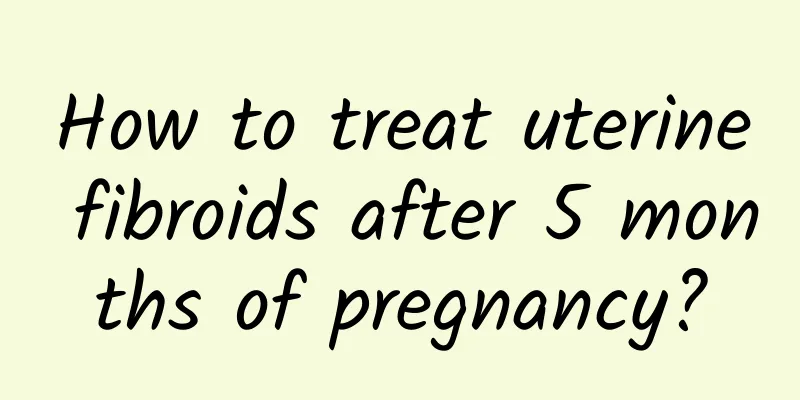How to treat uterine fibroids after 5 months of pregnancy?

|
Today, about one in five women of childbearing age suffers from uterine fibroids, but the vast majority of women discover they have uterine fibroids during early pregnancy and their first prenatal checkup. So, how to treat uterine fibroids after 5 months of pregnancy? Now, uterine fibroids are found after pregnancy, which makes many pregnant women very worried, so how to treat uterine fibroids after 5 months of pregnancy? In fact, the treatment should be determined according to factors such as pregnancy month, fibroid size, clinical manifestations, etc. 1. Treatment of uterine fibroids in early pregnancy: Intervention of uterine fibroids in early pregnancy is likely to lead to miscarriage, so it can be treated in the second trimester. If the fibroids are large, the chance of complications of continued pregnancy is estimated to be greater. If the patient requires an artificial abortion, the pregnancy can be terminated first, the fibroids can be removed in the short term, or an artificial abortion can be performed at the same time. 2 Treatment of uterine fibroids in mid-pregnancy: ① For those with fibroids less than 6 cm in diameter and no symptoms, most prenatal examinations do not require special treatment; ② The diameter of the fibroid is greater than 6 cm. As the uterine fibroid grows, it may continue to increase. Large fibroids are prone to red samples stimulating uterine contractions or peritoneal irritation symptoms. At this time, obstetricians only recommend that patients rest in bed and use analgesics for conservative treatment. Myomectomy during pregnancy is rarely recommended, only when necessary. 3 Treatment of uterine fibroids in late pregnancy: Small fibroids cannot be treated. If the fibroid diameter is larger than 8cm but there are no symptoms, you can wait until full-term cesarean section and perform uterine fibroid removal at the same time. Because large uterine fibroids may not only affect uterine contraction and production abnormalities, but also the possibility of postpartum placental retention, postpartum hemorrhage and postpartum infection is greater than that of normal pregnant women. In some cases, the uterus may also be forced to be removed due to postpartum hemorrhage or postpartum infection. |
<<: Can I still get pregnant if I have an ovarian cyst? What is the cause?
Recommend
Prevention of hyperprolactinemia in daily life
Gynecological diseases are very harmful to women....
3D perspective fat target accurate fat removal without pain or wounds
Body Slimming Arena 2012 New Medical Technology, ...
Eat alkaline food to lose weight and choose 5 seasonal fruits
If people with acidic constitution consume too mu...
What causes adnexitis?
Adnexitis is mainly caused by bacterial infection...
There is fat in the lower abdomen! Visceral fat is to blame
In the eyes of female friends, the lower abdomen ...
Want to make your double chin disappear? Follow the experts to stimulate the acupuncture points to avoid bloating and easily achieve a small V-face
Many girls like the fashionable "small V-sha...
The night is full of partying during the holidays, and nutritionists will teach you how to eat as much as you want without gaining weight!
There is always a carnival atmosphere at the end ...
What are the commonly used examination methods for uterine effusion?
What are the examination methods for uterine effu...
How to prevent endometrial tuberculosis
Nowadays, women are very impulsive, so they have ...
What are the causes of vulvar leukoplakia?
What are the common causes of vulvar leukoplakia?...
Women can eat more garlic to prevent fungal vaginitis
Many female friends suffer from gynecological dis...
6 foods to reduce excess fat! Hollywood actresses teach healthy eating
Although starving yourself recklessly or eating o...
What is the cause of irregular menstruation?
What causes irregular menstruation? The reasons f...
Can I get pregnant if I have vulvar leukoplakia?
The appearance of vulvar leukoplakia is very harm...
What are the symptoms of cervical warts in babies
What are the symptoms of cervical warts in infant...









